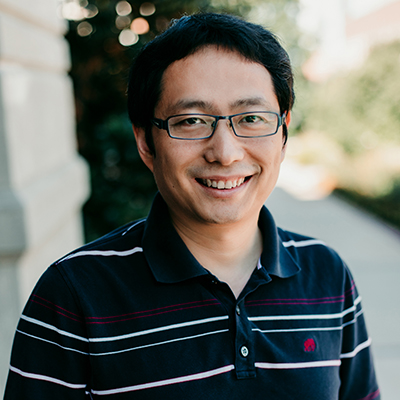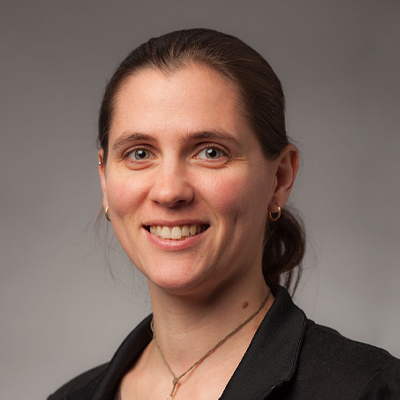Get started with Mizzou
ApplyDoctor of Philosophy
Dedicate yourself to understanding and transforming how people learn. The online Ph.D. in information science and learning technologies from Mizzou builds off your background through an immersive, research-intensive, collaborative and interdisciplinary course of study. In the process, you prepare to develop more engaging environments, programs and tools for business and educational purposes.
Take classes on campus or entirely online to explore the intersection of learning, information retrieval and discovery. Course work and a dissertation intended to contribute to the field grow your knowledge of usability, instructional design, information science, risk assessment, digital curation and improving information access. Assess the use and performance of these technologies in diverse settings to look toward an advanced research, industry, government or higher education role following graduation.
Why Earn a PhD in information science and learning technologies?
Over the past 20 years, emerging digital technologies significantly overhauled the learning environment and information retrieval. Their introduction ushered in multifaceted possibilities for accessing resources, creating classrooms and supporting materials and uncovering new topics.
Mizzou’s School of Information Science and Learning Technologies (SISLT) not only conducts research directing the field’s growing applications but pioneers their possibilities. As an iSchool at an American Association of Universities (AAU) Research I institution, we incorporate these changes into course delivery and information exploration. Our faculty seized the potential of online learning early on and continue to question and observe how users interact with and absorb concepts through this interface.
In turn, the online Ph.D. in information science and learning technologies program stands upon this forward-looking platform, encouraging intensive collaboration between students and faculty:
- Conduct systematic research integrating theory and practice that contributes to the knowledge base of learning, information organization and retrieval, performance and/or technology.
- Learn from nationally and internationally respected faculty renowned for research and development.
- Rethink your approach to inquiry while considering the technical, cognitive, epistemological, cultural, political and economic factors influencing information retrieval and learning systems.
- Become a more engaged and critical researcher, and be prepared to publish your findings in peer-reviewed journals and present at conferences.
- Push boundaries in a collaborative, collegial and scholarly environment, where on-campus faculty teach your online classes and guide your research.
- Think about how your ideas may shape future learning technologies and improve curricula, program delivery and the overall learning experience.
- Factor in motivation, engagement and information retention to improve the digital environment, incorporate the latest technologies and help all learners succeed.
Frequently Asked Questions (FAQs)
Is the doctor of philosophy in information science and learning technologies program right for you? Learn more and view frequently asked questions that will help guide you.
Quick facts
Official name
Doctor of Philosophy in Information Science and Learning TechnologiesCampus
Program type
DoctorateAcademic home
College of Education & Human Development | School of Information Science and Learning TechnologiesDelivery mode
100% onlineAccreditation
Higher Learning CommissionCredit hours
72Estimated cost
$42,472.80*This cost is for illustrative purposes only. Your hours and costs will differ, depending on your transfer hours, your course choices and your academic progress. See more about tuition and financial aid.

Career prospects
Drive the next generation of online learning and information retrieval in research and development, academia, industry or government. Based upon their dissertation, previous experience or goals, our Ph.D. students advance or launch their careers in higher education, public policy or private research, focusing on interactive design, instructional design, or library and information systems.
Potential paths include:
- Professor of information science and learning technologies
- Educational administration
- Library administration
- Research and development
- Developing corporate training programs or information systems
Program structure
The Ph.D. in information science and learning technologies involves 72 credit hours. Students may attend the program entirely online or opt to take select courses on campus. Transfer up to 30 master’s-level credits toward the degree.
The program’s structure includes:
At least nine credit hours of ISLT doctoral seminars: Delve into the field’s latest research while refining your writing skills.
Research and dissertation: Prepare a single piece of extensive research or three short, article-style studies. SISLT does not restrict research hours but expects all candidates to produce innovative, ideally cross-disciplinary results that ignite conversations and impact the field. SISLT currently concentrates its research on the information needs of low-income and rural communities regarding public health, training the engineering workforce on innovation and creativity, tools and systems for digital publishing, video games as an emotional coping mechanism, teaching practices and efficiency, techniques for developing learning games, supporting libraries and their information resources and preserving broadcasts, archeological artifacts, data and photography.
Course work: In addition to doctoral seminars, complete at least 18 credit hours of related electives, nine credit hours of education research methodologies and at least nine credit hours in a related emphasis area, such as psychology, sociology, political science, journalism or anthropology. Research courses build upon what you know about applied statistics, and quantitative and qualitative analysis.
Residency requirement: Illustrate your commitment to discovery and scholarly engagement by participating in research, professional service or system design and development.
During this sequence, SISLT requires Ph.D. candidates to put together a portfolio of professional projects highlighting their achievements, particularly those presenting a solution or with real-world applications. Candidates further work with an adviser to develop their program of study and residency plan and take both qualifying and comprehensive examinations.
Based upon commitments, full-time students typically take three courses each semester and finish the program in three to four years. Part-time students take one or two classes each semester and finish in four to five years.
Electives and interest areas
Explore topics in and contribute to the discussion around:
- Engineering education
- Educational gaming and simulation
- Information organization, access, and dissemination
- Information seeking and use
- Interactive learning environments including VR, embodied and augmented learning
- Libraries, archives, museums, and other cultural heritage institutions
- Reading, gaming, and other immersive experiences
- User eXperience (UX) and Human computer interaction (HCI)
- Digital humanities
- Educational technologies
- Scholarly communication and science of science
- Learning sciences, including learner-centered design, educational technologies and instructional design
Review all courses and requirements for the Ph.D. in information science and learning technologies.
Delivery
100% onlineCalendar system
Semester-basedTypical program length
3-4 years (full-time), 4-5 years (part-time)Typical course load
3 classes per semester (full-time), 1-2 classes per semester (part-time)Accreditation
The University of Missouri is accredited by the Higher Learning Commission, one of six regional institutional accreditors in the United States.
Faculty spotlight

In addition to her role as a dean in the College of Education and professor of library science, Dr. Moore serves as a faculty member in the MU Institute for Data Science and as an affiliated faculty member. Her experience encompasses the human-centered and usability design of performance support technology and online instructional environments.

Xinhao Xu is an associate professor in the College of Education and Human Development at the University of Missouri. Dr. Xu’s research interests focus on embodied interactions and learning, immersive virtual learning environments and game-based learning for STEM subjects. Utilizing both quantitative and qualitative methods, he has been actively conducting research on learning and training in technology-enhanced environments to pursue answers to the umbrella research question of how to use technology to help people learn.

Danielle Oprean's research focuses on understanding the role of immersion in comprehending virtual space as a means to transfer knowledge to a number of applications include learning spatial concepts, decision-making and design. She has experience in developing learning environments, including her experience working with the iSocial project, on different gaming platforms and works with different virtual and augmented reality technology. She currently works in researching the value of creating and using virtual field trips as a means to supplement both the traditional and the online classroom through situated exploratory learning and decision-making.

Jenny Bossaller holds a bachelor’s in archeology (BA), a master’s in library and information sciences, and a PhD in information science from the University of Missouri. Before joining the Mizzou faculty, Bossaller taught in the School of Library and Information Science at the University of Southern Mississippi. In addition to coauthoring numerous journal articles, she has earned an excellence in teaching award from the University Professional and Continuing Education Association and the David Cohen/EMIERT Multicultural Award for her research of multiculturalism in libraries in North America. Her areas of expertise include public library and social equity library history, and adults’ reading interests
